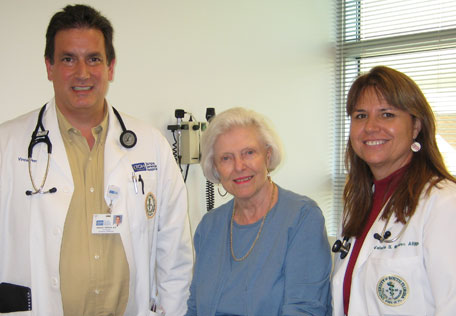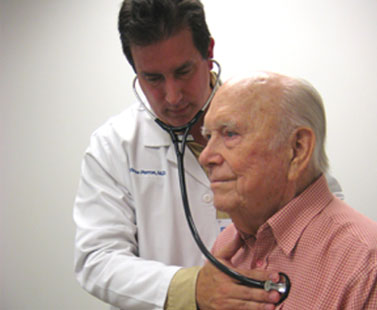Baby boomers beware: Geriatrician shortage could impact care
Think about it.
If the number of students doubled and the number of teachers didn’t, that would be a problem, right?
Well, a parallel to this scenario is actually taking place in the health care world: our elderly population will double by 2030 and the number of geriatricians will remain the same.
There will be a shortage of trained geriatricians, said Vincent Perron, MD, chief of the Division of Geriatric Medicine at USF.
“Currently, only one in 5,000 adults age 65 and older is under a geriatrician’s care,” Dr. Perron said. “And with expected swell in that population as the baby boomers enter their senior years, we need more geriatricians and more of our primary care physicians need geriatric training.”

Geriatricians are typically primary-care physicians (family medicine, internal medicine or psychiatry) who have completed additional training within geriatrics (a full year of fellowship training). In addition to promoting wellness and prevention among their senior patients, geriatricians place an emphasis on care management and coordination so patients maintain functional independence. More than younger adults, older patients have special needs associated with chronic illness (will they tolerate the prescribed interventions when considering their multiple chronic illnesses?).
One of the main reasons for the shortage is that medical residents aren’t choosing geriatrics as a specialty, due to poor reimbursement and the increased demands of the older patients, Dr. Perron said.
“The elderly simply require more time and, so far, Medicare just doesn’t reimburse for the extra time,” he said.
For example, the logistics of getting to the physician’s office, into the room, and up on the examination table can be cumbersome for many senior patients, not to mention the task of filling out of forms and keeping up with physician directions, prescriptions and procedures. In addition, many patients have hearing and/or vision impairments, which adds to the effort.

In short, the elderly require more time to manage their multiple medical needs.
And the demand is growing.
By 2030, one of every five people in this country will be over age 65. People age 85 and older are the fastest growing segment of the entire population and it is the members of this group who are the largest consumers of health care.
Although practitioners within all specialties will need to step up to deliver health care to this growing population, Dr. Perron said, there is still the need to focus more squarely on the 15 to 20 percent of the elderly who are the oldest, most frail of the group and who are more likely to have functional limitations.
“You don’t treat an 85-year-old patient the same as you would an active 50-year-old patient,” he said. “It’s going to be a challenge to meet this change in the demographics of our country.”
Help the USF Division of Geriatric Medicine raise funds for its Geriatric Medicine Fellowship Program.
November 14
Cocktails and Silent Auction: 6 p.m.
Dinner: 7:30 p.m.Tampa Yacht and Country Club Ballroom
5320 Interbay Blvd., TampaSemi-formal attire
Please RSVP by Nov. 7
$100 per person, or if you wish to make a donation, or for more information, please call (813) 974-2460.
Story by Sarah Worth

